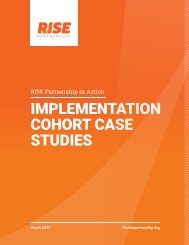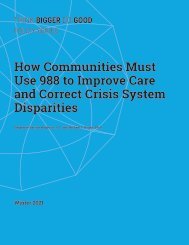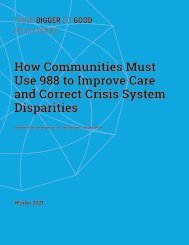Scattergood_IMD_Web
Create successful ePaper yourself
Turn your PDF publications into a flip-book with our unique Google optimized e-Paper software.
decreased funding for community-based interventions. It simply<br />
expanded the supply of inpatient beds available to Medicaid<br />
beneficiaries and removed barriers to care. Therefore, the tendency<br />
to frame investments in inpatient care and community care as<br />
a zero-sum scenario appears to be misguided.<br />
In addition, some states have applied for and received Section<br />
1115 innovation waivers to treat Medicaid beneficiaries in <strong>IMD</strong>s.<br />
Requests to waive the exclusion for substance use disorders<br />
and mental disorders are among the most common type of waiver<br />
applications. Seven states have received approval to receive<br />
Medicaid reimbursement for substance abuse services in <strong>IMD</strong>s,<br />
and one state has authority to receive Medicaid reimbursement<br />
for mental health services in <strong>IMD</strong>s. Five additional states are<br />
seeking authorization to provide substance abuse treatment<br />
for Medicaid beneficiaries in <strong>IMD</strong>s, and two have pending<br />
applications to provide mental health care in <strong>IMD</strong>s. Applications<br />
to waive the <strong>IMD</strong> exclusion rule come from politically and<br />
geographically diverse states, ranging from Arizona and West<br />
Virginia to California and Vermont (3).<br />
community-based care. Given the current structure of Medicaid<br />
as state administered and jointly funded, waiving the <strong>IMD</strong><br />
rule simply gives state health administrators another tool for<br />
treating a subset of acute patients.<br />
Repealing the <strong>IMD</strong> rule is fiscally responsible, medically<br />
appropriate, and ethically defensible. When hospitalization<br />
is required, the current Medicaid reimbursement structure<br />
incentivizes the use of psychiatric facilities with fewer than<br />
16 beds and inpatient care in non-specialized units throughout<br />
hospitals. Financially, limiting care to small facilities is less<br />
efficient. Because certain administrative costs remain fixed<br />
as facility size increases, the <strong>IMD</strong> rule prevents public payers<br />
from taking advantage of economies of scale. Furthermore,<br />
providing care for psychiatric emergencies in non-specialized<br />
hospitals fails the basic ethical obligation to provide individuals<br />
with care in the most appropriate setting. Persons with psychiatric<br />
emergencies ought to be treated in psychiatric settings staffed<br />
by well-trained behavioral health professionals.<br />
These waivers carry the stipulation that <strong>IMD</strong>s cannot supplant<br />
community-based services, and applications to waive the <strong>IMD</strong><br />
rule are frequently paired with waivers to provide additional<br />
Table 1 Section 1115 Innovation Waivers for <strong>IMD</strong>s<br />
<strong>IMD</strong> for Substance<br />
Use Disorders<br />
Pending<br />
Arizona, Illinois, Indiana, Kentucky,<br />
Massachusetts, Michigan, Wisconsin<br />
Approved<br />
California, Maryland, Massachusetts,<br />
New Jersey, Utah, Virginia, West Virginia<br />
<strong>IMD</strong> for Mental Illness<br />
Pending<br />
Illinois and Massachusetts<br />
Approved<br />
Vermont

















